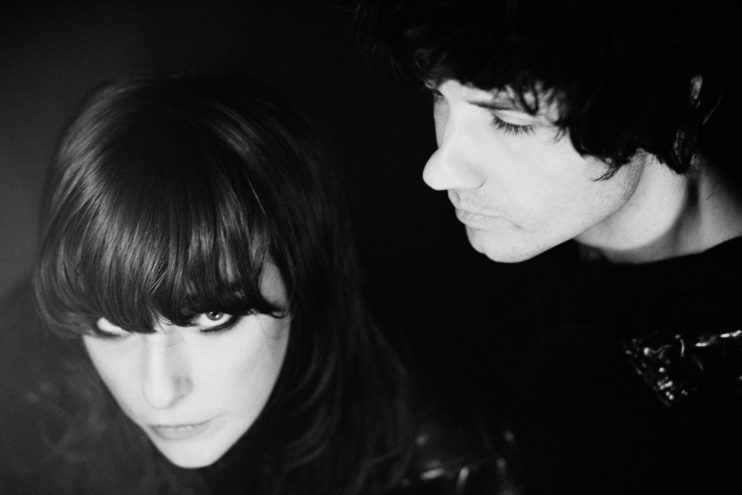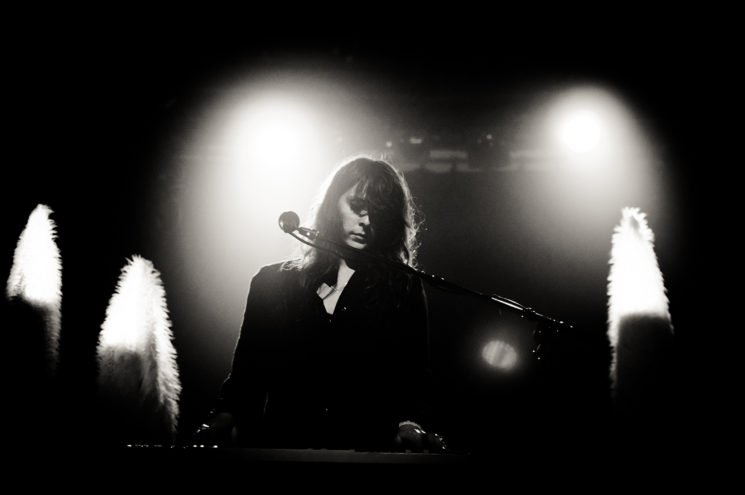Beach House


After thirteen years and six records, Beach House has continued sounding fresh with each release without significantly changing their formula. This is actually pretty commendable; they’d be justified in feeling like they’ve reached the apex of what they can do, but still they push forward. It’s almost like there’s this perfect articulation of their sound floating out in the ether, and each record is an attempt at tapping into its voice.
For Victoria Legrand, it’s “scope and scale” that sets each record apart, which makes sense. Sometimes Beach House is absolutely cosmic, like in Bloom, perhaps the band’s most grandiose recording to date. There are moments on that record that make you feel tiny, like the music is happening all around you and you’re just living in it. But the scale doesn’t necessary grow chronologically throughout their catalog, which is evidence of intention. Their most recent record, Thank Your Lucky Stars, was a return to some of the lighter, more whimsical pre-Teen Dream Beach House that sounds like it would be at home being played from a dollhouse victrola.
The new record, aptly titled 7, is a return to the more lush and stylish sound that made the band famous, but it’s refreshingly off-kilter. It’s at the larger scale of Bloom, but with all these new, more warped and discordant flourishes. In fact, the second half of “Dive” is probably the closest the band has ever come to sounding noisy or aggressive. It’s a fantastic record full of the swirling arpeggios and haunting vocals you’d expect from Beach House, but with some psyched out twists that separate it from the rest of their catalog and demonstrate that the band is still very much evolving.
This new sound came about in large part because the band completely blew apart their previous creative process. Much of the album was written (and even recorded) in the newly outfitted recording studio built into their Baltimore practice space, providing them the freedom to take risks and capture the vitality of new ideas in the moment. In the past, some of what made things feel electric during the songwriting could get lost in translation through the lengthy process of taking ideas from conception, to demoing, to studio recording. Collaborating with co-producer Peter Kember AKA Sonic Boom of Spacemen 3 also encouraged the band to follow their instincts and enabled them to go a little farther out than usual, resulting in the “newest” sounding Beach House album since Teen Dream.
ELEVEN: You’ve been a band for thirteen years. Are there any particular challenges or rewards you’ve found come along with being a part of a collaborative project for that amount of time?
Victoria Legrand: One of the greatest gifts I’ve got in this life is having found a musical partner that can understand what I’m trying to achieve without words and help me find it. Same thing with Alex; he’s looking for something that I’m able to provide. And James Barone–who’s been drumming with us for over two years and really contributed a lot to this album–he has wonderful amounts of energy and creativity. And then working with Sonic Boom, all of that invigorated us at a point in our career that I think is vital.
We have seven albums, and I think we’re really lucky to still be discovering new potentials. It’s easy to just dry up, get all stale, and be bored with what you’re doing. I think it depends on the person; how curious you are, how undeniably playful your relationship is with the world. Part of getting older is that it seems like a lot of doors start shutting. People you’re friends with disappear. People pass away, people get married, have children. Things start to get very serious. You know, the obvious things we all encounter; you look at yourself in the mirror and notice a new line or a new dark circle. But there’s another way of looking at it. When the physical realm is going down on the rollercoaster, the internal world has to go up. It’s who you are as a person, it’s the energy you put out, the kindness you emit. You have to work a bit harder as life goes on. Even if you get more tired you have to work harder at certain things; find more activities and exercises that help excite you so you don’t just crumble.
11: How do you think the band has changed sonically, musically, or aesthetically over the long arc of your career?
VL: There is this core to the band that has been there throughout, an elemental core, that is Alex and I and our love of music and our love of the experience of creativity. Then there are these waves that are every album, each one representing a period of time in our lives and an expression of many forces. When I say waves, I mean the direction that the albums go and their different sizes. They all have a different scope and scale. I think scale is one of the most fascinating artistic concepts; I think it’s everything. It’s how big or small something is, and how big or small it makes you feel. I think every album has a different scale. We’re continuing to explore the possibilities of scale in what we do. When you have limitations, like two people playing and writing all the music… It’s some buddhist thing, like “less is more.” It’s like you only have a wire and some clay, but the way you can cut the clay with the wire or use the wire to build the clay upon itself and keep making new forms is maybe never ending.
11: With that in mind, what feels new about 7?
VL: We’ve always found rhythm and beats inspiring, and I think we were really focused on how they can create different feelings with this record. Rhythm is a big force that has developed for us overall. We keep discovering new colors and new energies from the various rhythms that we explore.
11: What excites you about the record?
VL: I’m most excited about being able to convey the ideas that have been inspiring us for the last couple of years. That’s about the amount of time it takes to incubate and filter everything that’s been speaking to us the strongest from the outside world. The things that inspire us–the melodies we hear, the things we write, the books we read, the movies we watch–these things are expressed in the music we make. And I’m excited about the live show and all the energies that have yet to combine and happen around that. I’m excited for those moments when we play a show and there’s all this energy. I’m excited to hear people’s interpretation of the music, their feelings and reactions.

11: You were thinking a lot about dualities with this record, like how beauty can be an unexpected result of dark times or how shared trauma can inspire empathy. What kind of experiences drove you into that thematic territory?
VL: I think for everyone in 2017–well not everyone I guess, but most humans that have a heart and emotions and are in tune with nature–felt a kind of darkness move in. Darkness is always part of everything. Every light is balanced with some form of darkness; that’s a simple truth of the universe. But recently there’s a feeling of chaos and a feeling of not knowing what is real. What does it mean to tell the truth? There’re all these questions that have historically cycled over and over again that we’re dealing with. Not in an overtly political way, though. I don’t think this is a “political” record. Like all the other records we’ve made, we’re touching on human emotions, issues, feelings, and shared experiences like heartbreak, love, curiosity, outer space, whatever; the things we all dream about at night.
11: How do you see the context of our current place and time seeping into the actual music?
VL: The night Alex presented me the beginning of “Black Car,” I was very much taken aback. I thought it very much had a feeling of nighttime and darkness, like there was something very unknown about it; there was almost a futuristic feel to it. It sparked all these new realizations and ideas that completely made sense to me in the present context. That’s kind of how we work. We’re kind of observing all the energies in the world, but we’re also artists and musicians so we have this freaky thing that occurs where we hear corresponding melodies and are constantly playing with things, throwing them up in the air and seeing where they land. I think it’s all about the combination of those two dimensions: daily life that we all are a part of and then the bigger things that transpire that our antennae are picking up.
11: You created a studio in your practice space in Baltimore to demo out some of the stuff you’d ultimately record for this record, what kind of creative doors did that open for you?
VL: It opened a lot of creative doors. I think this record happened as quickly as it did because of the liberty and luxury of having our own studio. With previous records, we’d do demos and then we’d re-record all of the songs later in a professional studio, so they’re being recorded multiple times, and that got really old. By the time we got to Depression Cherry, there was this fatigue. We wondered why things in the songs would change by the final recording. It was just really frustrating having someone between us and the recording. Even though we were there and we were participating, it felt like there was always a gatekeeper, and we were finally just sick of that. We were finally like, “No! We’re cutting out as many middlemen as we can!” The home studio really facilitated that process because we were writing and recording at the same time and were keeping a lot of the things we recorded in Baltimore. The album is really a hybrid of things we recorded in Baltimore while writing the songs and what we did in the more professional studios.

11: And you worked with Sonic Boom as well, what did he bring to the table?
VL: He co-produced the record with us. He was a very necessary energy that we didn’t know we needed until we had it. He just helped create a space that was not overly intellectual, that was more about feelings and experimenting and just letting the music sit. We were still very much predominately the writers of all the music. We’ve never worked with a producer that would get in the way of that. I think working with us, people understand what they’re dealing with, which is that there are two people who write and who have a lot of production ideas already. We’re not looking for someone who’s going to do that for us, and I think Sonic Boom understands that because he’s the same kind of artist. He has a wonderful aesthetic sense, and he’s had an incredible career. He’s just a really respectful, wise, human being. He contributed many moments on the record that helped boost certain parts of songs. He has the ability to experiment with sounds and find the things that will add that particular little moment that’s really wonderful; it really helped us find more magic.
11: You also said he helped you shed conventions and not let yourself get carried away with the higher-level production tools at your disposal when you’re in a professional recording studio, what kinds of routines or aesthetic conventions from previous records were you wary of?
VL: We’ve never really been gearheads. We don’t particularly care much about expensive vintage gear, or newer stuff either. If we find a new instrument, it could be a broken piece of trash, but we keep it if we can find something about it that works. It’s always been about what the instrument has to offer, not about the dumb value of it. In past recording situations, we’ve made demos we liked, but in some producer’s mind some aspect of it sounds horrible. They’re like, “Ewe! All this noise, all this grit; it sounds like shit. It’s too lo-fi.” We love it because it has character, it has something to it that feels very raw and real to us, but the person recording it for us is like, “No no no. We need to put it through this, this, and this.” Nothing changed in the way we work and what we love. We’ll always love things for what they are. We’re not trying to be fancy about things. I think Sonic Boom is the same way. He’s a tasteful person; we’re tasteful people. He really was like a reminder to just have fun with things. He reaffirmed these ways that we’ve always tried to work. No one fucking cares if there’s some specific microphone to record this one little thing. It’s about how it makes you feel in the end. It’s a little bit of a punk way of doing things. Just do it, and if you like it, you like it, and there’s no questioning that. It really bothers us as artists when we get away from that. We like to move quickly, and we were finally able to do that with this record.



